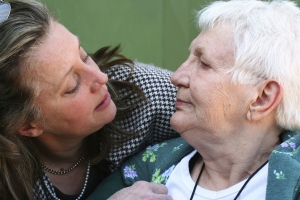Dementia is a progressive condition that will affect a person’s memory and their ability to retain certain information, such as names and dates. There may come a time when your loved one’s ability to communicate with you diminishes. This can be a difficult, but there are ways that you can effectively communicate with someone who lives with dementia, ways to encourage communication, and converse with them without causing confusion.
Difficulties that arise when communicating with someone with dementia
Over time, someone who suffers with dementia can seem to change. This change in personality is caused by the condition affecting particular parts of the brain. As the condition begins to affect more parts of the brain, symptoms can increase to include diminishing language ability, cognitive function, attention span, judgement, and understanding of new information, as well as memory.
Your loved one may encounter a few or all of the above symptoms, which can affect their ability to communicate with you. It’s important to remember that what appears to be changes in your loved one’s personality is not your loved one becoming angry at you. It is the disease that is causing the change, so it’s important not to blame yourself. Instead, encourage communication with your loved one. You can’t stop the symptoms of dementia, but there are techniques that you can use to make those symptoms much easier to deal with.
To read about the different types of dementia, please click here.
How to communicate with dementia customers effectively
• Use clear straightforward language – In order to avoid confusion you should be clear about what you mean and avoid sarcasm or irony that could be inferred differently by your loved one. Talk about one thing at a time and try to use closed questions. Instead of asking “what would you like to eat?” try asking “Would you like to eat toast or fruit?” this will still give your loved one a choice while avoiding any confusion.
• Include your loved one – Even if your loved one is struggling to use language to communicate with you, it’s important to remember to give them the opportunity to communicate. Including them in conversations with the rest of the people in the room is vital to encouraging further communication when your loved one may be having a better day.
• Be predictable – Consistency in the life of someone living with dementia is a great way of demonstrating that you are someone that they can completely trust. Think carefully about how you shop for food. Have you chosen something different to eat today that your loved one won’t recognise? You may find that routine is actually one of the best ways to communicate to your loved one that you can be trusted.
• Use visual prompts – Photographs and familiar objects can be a great way of discussing memories with your loved one. Put a box together for your loved one for when you visit, and include photographs of family and friends as well as objects that may trigger a memory of a family holiday or an interest that they may want to continue being a part of.
• Be calm and patient – There may be times when your loved one becomes frustrated and loses their temper or becomes confused about where they are. Try not to overreact. If they see that you are calm, this will have a calming effect on them.
• Let them lead the way – For those living with dementia there will be ups and downs. It’s important to recognise your loved one’s mood and whether they’re having a good or bad day, so that you let them dictate how much they want to communicate with you at the particular time. It’s vital to recognise where the person is, whether they know where they are, whether they recognise the people around them, and if they feel uncomfortable. Adapting to where that person is in their mind-set is helpful in effectively communicating with them, to reassure them, and just so that you can talk about the period of time that they are living in right now.
• Use body language – As using language becomes more difficult for your loved one, using other forms of communication can be very effective. Remember that, even if your loved one does not fully understand what you are saying they will recognise the expression on your face. They will recognise a reassuring hand gesture. Try to accompany what you say with other sights and sounds. For example, the same music played during a meal could let your loved one know that it’s time to eat each day.
Dementia care from Helping Hands
If you want to discuss extra home care support for someone living with dementia, contact Helping Hands Dementia Helpline on 0808 161 1626. We have specialist dementia carers who can answer any questions you may have and offer home support to customers suffering with dementia.
You can also access a free dementia care guide to help you care for your loved one.

